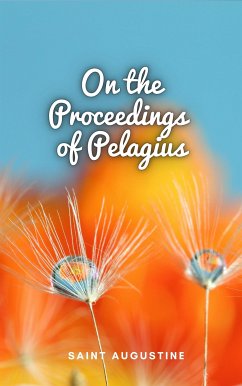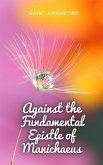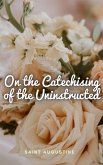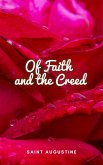"On the Proceedings of Pelagius" by Saint Augustine represents a critical moment in theological discourse, capturing the essence of Augustine's vigorous defense against the teachings of Pelagius, a British monk whose theological views challenged the doctrines of original sin and divine grace. In this polemical work, Augustine engages in a rigorous examination of Pelagius' teachings, dissecting their theological implications and exposing what he perceives as their dangerous errors.
Central to Augustine's critique is his assertion of the doctrine of original sin—the belief that humanity inherits a sinful nature as a result of Adam's transgression in the Garden of Eden. Augustine argues vehemently against Pelagius' assertion that individuals possess the innate ability to achieve salvation through their own moral efforts, insisting instead that salvation is entirely dependent upon divine grace.
Throughout his treatise, Augustine meticulously dissects Pelagius' arguments, highlighting what he views as inconsistencies, contradictions, and departures from orthodox Christian doctrine. He warns against the pernicious influence of Pelagianism, which he sees as a heretical distortion of biblical truth that threatens to undermine the foundations of Christian faith.
Moreover, Augustine's critique of Pelagius extends beyond theological disagreement to encompass broader questions of human nature, moral responsibility, and the nature of divine sovereignty. He wrestles with profound questions concerning the relationship between God's grace and human free will, seeking to reconcile the apparent tensions between divine predestination and human agency.
In "On the Proceedings of Pelagius," Augustine emerges as a formidable defender of orthodox Christian theology, marshaling his considerable intellectual prowess and theological acumen in defense of what he perceives as essential truths of the faith. His polemic against Pelagianism serves as a potent reminder of the enduring theological controversies that have shaped the development of Christian doctrine and belief.
Ultimately, Augustine's engagement with Pelagius reflects not only a theological dispute but also a profound concern for the integrity of Christian faith and the salvation of souls. Through his rigorous critique of Pelagianism, Augustine seeks to safeguard the foundational principles of Christian orthodoxy and to uphold the primacy of divine grace in the process of salvation.
Central to Augustine's critique is his assertion of the doctrine of original sin—the belief that humanity inherits a sinful nature as a result of Adam's transgression in the Garden of Eden. Augustine argues vehemently against Pelagius' assertion that individuals possess the innate ability to achieve salvation through their own moral efforts, insisting instead that salvation is entirely dependent upon divine grace.
Throughout his treatise, Augustine meticulously dissects Pelagius' arguments, highlighting what he views as inconsistencies, contradictions, and departures from orthodox Christian doctrine. He warns against the pernicious influence of Pelagianism, which he sees as a heretical distortion of biblical truth that threatens to undermine the foundations of Christian faith.
Moreover, Augustine's critique of Pelagius extends beyond theological disagreement to encompass broader questions of human nature, moral responsibility, and the nature of divine sovereignty. He wrestles with profound questions concerning the relationship between God's grace and human free will, seeking to reconcile the apparent tensions between divine predestination and human agency.
In "On the Proceedings of Pelagius," Augustine emerges as a formidable defender of orthodox Christian theology, marshaling his considerable intellectual prowess and theological acumen in defense of what he perceives as essential truths of the faith. His polemic against Pelagianism serves as a potent reminder of the enduring theological controversies that have shaped the development of Christian doctrine and belief.
Ultimately, Augustine's engagement with Pelagius reflects not only a theological dispute but also a profound concern for the integrity of Christian faith and the salvation of souls. Through his rigorous critique of Pelagianism, Augustine seeks to safeguard the foundational principles of Christian orthodoxy and to uphold the primacy of divine grace in the process of salvation.









